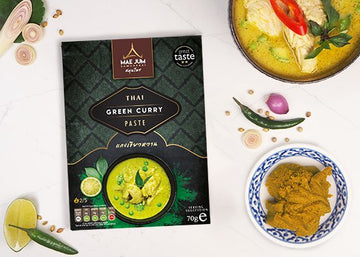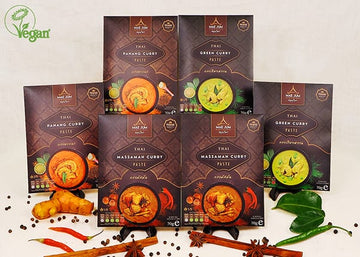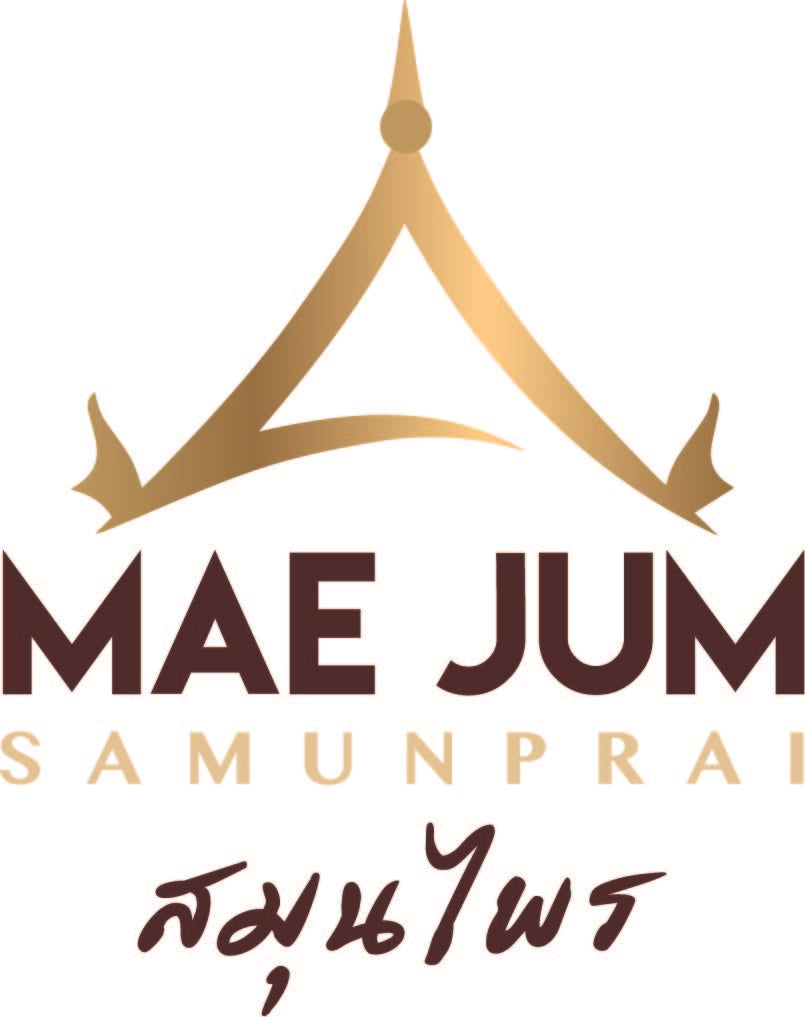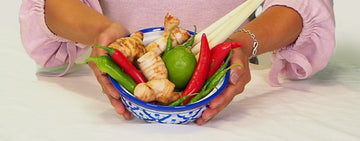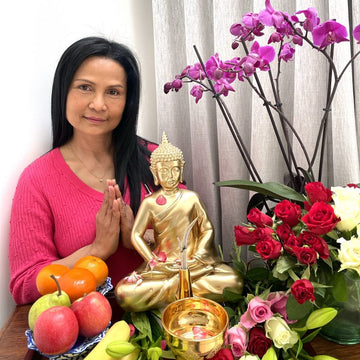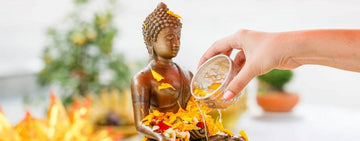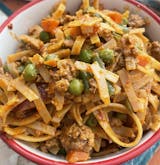Exploring Samunprai Ingredients: The Herbs and Spices of Traditional Thai Cuisine
Thai cuisine is globally renowned for its bold, complex flavours that result from the perfect balance of fresh herbs and spices. Beyond the sensational taste, these ingredients have been used for centuries in Thai cooking not only for their flavour but also for their medicinal properties. This blend of culinary and health benefits is deeply rooted in Thai culture, particularly through the practice of Samunprai, an ancient tradition that combines the use of herbal remedies with daily cooking.
Samunprai, meaning "traditional herbal therapy" in Thai, involves the use of natural herbs and spices in food and medicine, passed down through generations. Many of the key ingredients used in Samunprai are the same as those found in traditional Thai cooking, offering a dual purpose: to tantalise the palate and promote well-being. In this blog, we’ll take an in-depth look at some of the essential herbs and spices used in Thai Samunprai and how they contribute to both flavour and health.
What is Samunprai?
Samunprai is a traditional form of Thai herbal therapy that blends cooking, medicine, and beauty practices. Historically, Thai people believed that natural herbs and spices held the power to heal the body and mind, whether consumed in food or applied externally. Samunprai focuses on the holistic healing properties of herbs to treat ailments, relieve stress, and promote overall wellness.
In addition to its culinary uses, the Samunprai tradition includes herbal poultices, massages, and steam baths infused with natural herbs and essential oils. These treatments are designed to improve circulation, detoxify the body, and provide relaxation. The same herbs that are used in Samunprai massage, such as lemongrass, kaffir lime, and galangal, are also essential ingredients in Thai cooking. This integration of food and therapy shows how closely health and nutrition are linked in Thai culture.
Key Herbs and Spices in Thai Samunprai and Cooking
Thai cuisine and Samunprai share many of the same ingredients, with herbs and spices playing a crucial role in the flavour and medicinal benefits of Thai dishes. Here are some of the most important herbs and spices used in Mae Jum Thai curry pastes and other traditional recipes.
1. Kaffir Lime
Native to Thailand, kaffir lime is a key ingredient in Thai cooking, offering an amazing aroma and distinctive taste. Both the fruit and its leaves are used extensively in Thai cuisine. The leaves have a zesty, citrus flavour, which is particularly important in soups and curries. Kaffir lime leaves are often added whole to broths and removed before serving to infuse dishes with a fresh, bright flavour.
In Samunprai, kaffir lime is revered for its cleansing properties and is commonly used in traditional herbal steam treatments to detoxify the skin. The rind and juice are also used in Thai dips and salads, while the fruit’s essential oils have antibacterial properties and are often used in natural remedies to promote healthy digestion and immune function.
2. Red and Green Chillies
Red and green Thai chillies are synonymous with Thai cuisine. Known for their fiery heat and vibrant colours, these chillies are used in a wide range of Thai dishes, from curries to stir-fries and soups. The heat of Thai chillies comes from capsaicin, a compound known for its health benefits, including boosting metabolism, relieving pain, and improving heart health.
In Samunprai, chillies are used not only for their medicinal properties but also to invigorate the body and improve circulation. In combination with other herbs, Thai chillies can help relieve muscle pain and tension, making them a key ingredient in Thai herbal poultices.
3. Galangal
Often confused with ginger due to its similar appearance, galangal is an essential ingredient in Thai cooking and Samunprai. It has a sharper, more peppery flavour than ginger, with a hint of citrus. Galangal is commonly used in Thai soups, such as Tom Yum, and in curry pastes. The spice brings a complex, aromatic depth to dishes, making it a must-have in Thai cuisine.
In traditional Thai medicine, galangal is prized for its anti-inflammatory and digestive benefits. It’s known to ease nausea, improve circulation, and support healthy skin. In Samunprai treatments, galangal is often added to herbal compresses and baths to help detoxify the body and soothe sore muscles.

4. Lemongrass
Another signature ingredient of Thai cuisine, lemongrass provides a fresh, citrusy fragrance and flavour that’s integral to many Thai dishes, including soups, salads, and curries. Its zesty notes enhance the overall flavour of a dish without overpowering other ingredients.
In Samunprai, lemongrass is used for its detoxifying and soothing properties. The essential oils in lemongrass have natural anti-inflammatory and antibacterial effects, making it a popular ingredient in herbal teas, steam baths, and massage oils. It’s particularly effective at relieving stress, promoting relaxation, and improving digestion.
5. Coriander (Root and Seeds)
Coriander is a versatile herb used in many forms within Thai cuisine. While the leaves are commonly used as a garnish or in salads, the root and seeds are vital to cooking, especially in curry pastes. Coriander root provides a deeper, more intense flavour than the leaves, and it’s often blended with garlic and chillies to create a flavourful base for Thai dishes.
Coriander has numerous health benefits, including its ability to regulate digestion, reduce inflammation, and lower blood sugar levels. In Samunprai, coriander is often used in detoxifying treatments and as a natural remedy for balancing cholesterol levels and supporting cardiovascular health.
6. Peppercorns
While chillies are often credited with bringing heat to Thai dishes, peppercorns also contribute their own distinctive short-lasting heat. Both fresh and dried peppercorns are used in Thai cooking, especially in dishes like Thai Jungle Curry, where their heat complements the intense flavours of other ingredients.
In traditional Thai medicine, peppercorns are valued for their ability to stimulate circulation and improve digestion. They are often used in herbal treatments to relieve bloating and other digestive issues.
7. Turmeric
Turmeric has gained widespread recognition for its powerful medicinal properties, but it has been a staple of Thai cooking and Samunprai for centuries. Known for its vibrant yellow colour, turmeric is used in Thai Yellow Curry and Southern Thai dishes. The spice has a warm, earthy flavour with a slightly bitter undertone, and it’s often combined with black pepper to enhance its absorption in the body.
Turmeric’s active compound, curcumin, is a potent anti-inflammatory and antioxidant, making it an essential ingredient in traditional Thai medicine. In Samunprai treatments, turmeric is used to detoxify the body, improve skin health, and reduce inflammation. It’s particularly effective when combined with other herbs and spices in poultices, massages, and teas.

8. Thai Shallots
Thai shallots, a smaller and more delicate variety than common shallots, are a staple in both Thai cuisine and Samunprai. Their flavour is milder and sweeter than that of regular onions, making them ideal for balancing the intense heat and boldness of spices in Thai dishes. Often used in curry pastes, stir-fries, and soups, Thai shallots add depth and richness to the flavour profiles of these dishes.
Shallots are commonly roasted or fried to bring out their natural sweetness before being added to pastes, where they blend seamlessly with other ingredients like garlic and chillies. In addition to their culinary value, Thai shallots are known for their health benefits, which include anti-inflammatory and antioxidant properties. They are rich in vitamin C, quercetin, and other compounds that support the immune system, improve circulation, and promote healthy skin.
In Samunprai, Thai shallots are sometimes used in poultices or compresses to soothe sore muscles and reduce swelling, reflecting their dual role in both cooking and traditional healing practices. Their mild yet complex flavour and health benefits make them an essential ingredient in many curries, adding both richness and wellness to every dish.
9. Garlic
Used throughout global cuisine, garlic is a familiar ingredient in Thai cooking, where it adds depth and richness to sauces, pastes, and stir-fries. In Thai curries, garlic is often pounded with other herbs and spices to create a fragrant paste that forms the foundation of many dishes.
Garlic is also a powerful natural remedy. Its antibacterial, antiviral, and antifungal properties make it a key ingredient in Samunprai treatments aimed at boosting the immune system, fighting infections, and promoting heart health. Garlic is used both in cooking and as a topical treatment in traditional herbal poultices to ease respiratory conditions and skin infections.
10. Cinnamon, Cardamom, Nutmeg, Cloves, and Cumin Seeds
These aromatic spices are common in Asian cooking and add a unique flavour to certain Thai dishes, especially curries and marinades. The spices bring warmth and complexity to pastes, and their fragrant aroma complements the more pungent herbs like garlic and lemongrass.
In Samunprai, these spices are often used to improve circulation and ease digestive issues. Their warming properties make them ideal for massages and compresses designed to soothe joint pain and improve overall vitality.

The Role of Samunprai in Thai Culture
Samunprai is more than just a cooking tradition; it’s a holistic approach to health and well-being that has been practised in Thailand for centuries. Rooted in the belief that food and medicine are intertwined, Samunprai uses natural ingredients to nourish the body from the inside out.
Thai herbal remedies, including those used in Samunprai, focus on preventive care. The philosophy behind Samunprai is that by incorporating herbs and spices into daily cooking and wellness routines, people can maintain balance within the body and ward off illness. In addition to food, the practice includes herbal steam baths, massage therapies, and compresses that help detoxify the body, improve circulation, and relieve tension.
Mae Jum’s Commitment to Samunprai: Crafting Pastes with Purpose and Tradition
Our founder, Jum, has great beliefs in Samunprai thai is deeply rooted in the traditional Thai philosophy that food and medicine are interconnected. Since her childhood, the use of herbs and spices were a part of everyday life, looking after one's body from the inside out and promoting health and well-being, Mae Jum creates her range of Thai pastes from her traditional family recipe with the same focus on balance and healing.
Each paste is crafted using fresh, high-quality ingredients like kaffir lime, galangal, lemongrass, and turmeric—all known for their therapeutic properties. Mae Jum’s dedication to preserving the essence of Samunprai ensures that her pastes not only deliver authentic Thai flavours but also contribute to a healthier lifestyle to all. By staying true to this time-honoured tradition, Mae Jum's pastes reflect her commitment to both culinary excellence and natural wellness.
Conclusion: Incorporating Samunprai Ingredients into Your Diet and Wellness Routine
The herbs and spices used in Samunprai are not only delicious but also offer a wide range of health benefits. By incorporating these natural ingredients into your cooking, you can enjoy the rich flavours of Thai cuisine while supporting your overall well-being. Whether you’re using kaffir lime to freshen up a curry, lemongrass to detoxify the body, or turmeric to reduce inflammation, the ingredients of Samunprai can enhance both your meals and your health.
Next time you prepare a Thai dish, remember that each herb and spice carries a long history of medicinal use. Whether in the form of a curry paste, soup, or herbal tea, these ingredients will add flavour, aroma, and healing power to your kitchen. And it doesn’t need to be difficult either when you have Mae Jum pastes nearby, so many to choose from with a range of heat levels, not to mention that they are so simple to cook with too. Be adventurous and start exploring the world of Thai Samunprai with Mae Jum, check out our delicious range of recipes and a quick browse of our shop!
If you enjoyed reading about Samunprai - Herbs and spices, please give this post a rating and subscribe for new blog updates and recipes. Follow and tag us @maejumsamunprai on social media for great foodie content and giveaway competitions! Read more on our blogs today!
